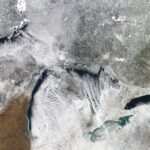What is lake effect snow? In the Great Lakes region, hazardous winter weather often happens when cold air descends from the Arctic region. Lake effect snow is different from a low pressure snow storm in that it is a much … Continue reading
Tag Archives: forecasting
Lake effect snow: What, why and how?
As fall comes to a close, those who live and work in the Great Lakes region are wondering what weather this winter has in store. An El Niño Advisory is currently in effect, which means El Niño conditions have developed … Continue reading
December 14, 2022
by Gabrielle Farina
Comments Off on Decades in the making, NOAA’s newest Lake Superior and Lake Ontario forecast systems become fully operational
Decades in the making, NOAA’s newest Lake Superior and Lake Ontario forecast systems become fully operational
Did you know that NOAA operates a forecasting system that predicts water conditions on the Great Lakes? Whether you’re wondering about a lake’s temperature, currents, or water level changes, NOAA’s got you covered! This fall, NOAA implemented newly updated versions … Continue reading
November 20, 2020
by Margaret Lansing
Comments Off on Lake effect snow: What, why and how?
Lake effect snow: What, why and how?
Winter is nearly here — and those who live and work in the Great Lakes region are already wondering what the winter of 2021 has in store. Early indications suggest a La Niña winter pattern, which shifts the odds towards cooler, … Continue reading
May 22, 2018
by Kaye LaFond
Comments Off on GLERL Ocean(lake)ographer Eric Anderson on watching the Straits of Mackinac
GLERL Ocean(lake)ographer Eric Anderson on watching the Straits of Mackinac
Eric Anderson is NOAA GLERL’s resident oceanographer (but his Twitter handle is @lakeographer—you should trademark that one, Eric). At its core, his research centers around the movement of water. You might have seen our animations of currents in the Straits … Continue reading
Great Lakes in winter: Water levels and ice cover
The Great Lakes, along with their connecting waterways and watersheds, make up the largest lake system on the planet—more than 20% of the world’s surface freshwater! Water levels on the lakes change in response to a number of factors, and these … Continue reading
GLERL researchers heading to AMS 2017
The American Meteorological Society’s Annual Meeting (AMS 2017) is upon us and researchers from GLERL and CILER (the Cooperative Institute for Limnology and Ecosystems Research), along with other partners, are hitting the grounds running on Monday with posters and presentations on climate, … Continue reading



